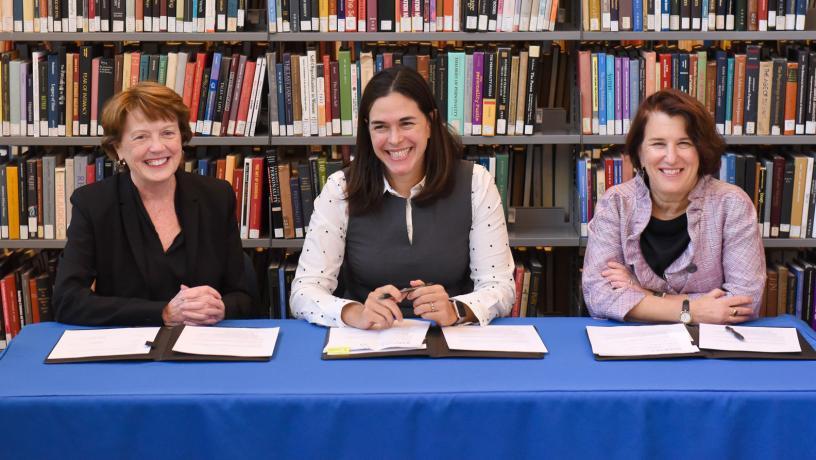Creating More Pathways for Women in STEM
A new partnership launches between Columbia Engineering and Barnard College

Columbia Engineering Dean Mary C. Boyce, Barnard President Sian Leah Beilock, and Barnard Provost Linda Bell formalized a new partnership between the schools.
Women engineers play such an important role in society, and we’re proud of what Columbia Engineering is doing to ensure the future of engineering serves all of humanity.
With an incoming undergraduate class of nearly 50 percent women, Columbia Engineering has become a leader in bringing gender parity to the engineering field. Now, a new partnership with Barnard College will significantly increase that talent pool.
Through a new “4+1” program jointly operated with Columbia, Barnard is providing an accelerated option for students who wish to take foundational and master’s level courses in engineering while they are still undergraduates. The two schools created the pathway for Barnard students who’d like to complete both a BA from their home institution and an MS from Columbia Engineering—making Barnard one of the first women’s colleges to offer a program of this kind.
“This new program provides several different pathways for Barnard students interested in engineering,” said Barnard President Sian Leah Beilock. “We have seen a tremendous increase in the percentage of Barnard students pursuing STEM fields, with over one-third of our recent graduates majoring in math and science. With this exceptional new opportunity, Barnard students can work toward realizing their future goals with the support of world-class faculty at both the undergraduate and graduate levels.”
“We are excited to partner with Barnard College on a new initiative that will help fast-track careers in engineering for these very talented young women,” Mary C. Boyce, dean of Columbia Engineering, said. “We hope that this accelerated pathway to biomedical engineering, chemical engineering, operations research, management science and engineering, business analytics, financial engineering, or industrial engineering will attract women from a variety of backgrounds who might not have considered engineering fields.”
Barnard–Columbia Engineering 4+1 students will be fully engaged in the Barnard curriculum during their undergraduate years while simultaneously working toward one of the master’s programs in the departments of chemical engineering, biomedical engineering, or industrial engineering and operations research. Each pathway is supported by designated Barnard and Columbia University faculty, and Barnard is working on several additional engineering and applied science pathways that it expects to be available to students by the next academic year.
“This partnership allows students the opportunity to pursue undergraduate majors in multiple disciplines that are purposefully aligned to specific graduate school pathways to the master’s degree in engineering,” said Barnard Provost and Dean of the Faculty Linda Bell. “It represents a unique opportunity for our students to broaden their disciplinary exposure and obtain skills that align well with the varied job opportunities we see emerging in labor markets. Barnard graduates from this program will be uniquely positioned—possessing the critical thinking skills innate to a Barnard education and the analytical and technical skills germane to an engineering degree in their area of specialty.”
This new partnership was celebrated with a formal ceremony this past fall. Dean Boyce joined President Beilock and Provost Bell to sign a memo of understanding and mark this important moment.
“Incorporating diverse perspectives enriches every field of study,” said Dean Boyce. “Women engineers play such an important role in society, and we’re proud of what Columbia Engineering is doing to ensure the future of engineering serves all of humanity.”
